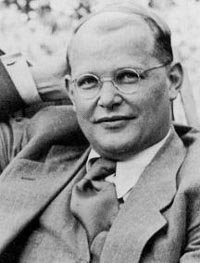Bonhoeffer on temptation

"The temptation of which the whole Bible speaks does not have to do with the testing of my strength, for it is of the very essence of temptation in the Bible that all my strength--to my horror, and without my being able to do anything about it--is turned against me; really all my powers, including my good and pious powers (the strength of my faith), fall into the hands of the enemy power and are now led into the field against me. Before there can be any testing of my powers, I have been robbed of them."
-Dietrich Bonhoeffer, Creation and Fall/Temptation: Two Biblical Studies, p. 112
Bonhoeffer's reflections on the nature of temptation and how to resist it are profound and if you haven't read them, you should. Temptation is such a horrific thing precisely because the enemy with which you are faced is you. You are your own Judas. You must combat your sinful desires with your holy ones and often, considering the strength of your holy desires, your prospects of overcoming temptation do not look good. It is not a matter of strength of will, for the will is the instrument, the modus operandi, of virtue and vice alike and the stronger the will, the more easily it can act in the face of conscience. Even your pious powers do not really overcome temptation for in overcoming your Corinthian self by reliance upon your piety alone you become your Pharisaical self instead.
The only antidote is being remade by Him who makes all things new.
Romans 7:24 "Wretched man that I am! Who will deliver me from this body of death? Thanks be to God through Jesus Christ our Lord!"
Romans 7:24 "Wretched man that I am! Who will deliver me from this body of death? Thanks be to God through Jesus Christ our Lord!"

1 Comments:
I’ve just started reading John Owen’s ‘Triumph Over Temptation’ (which seems pretty relevant here!) In it he breaks down Romans 7:21 (“I find then a law, that, when I would do good, evil is present with me”) in a way that really made me stop and think. He says, ‘Notice that Paul states four things in this verse. First, he says that sin is a “law”. Second, he describes this discovery: “I find a law”. Third, he indicates the context of this discovery: “when I would do good”. Fourth, he specifies the state and activity of this law of sin: “evil is present with me”.’
Post a Comment
<< Home